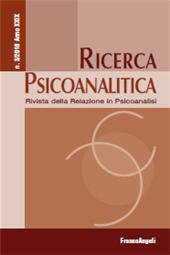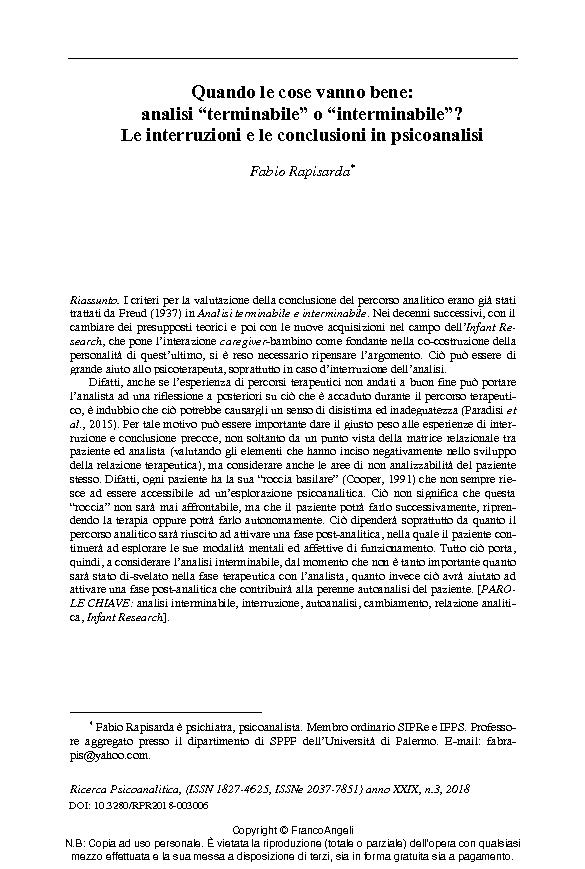Quando le cose vanno bene : analisi terminabile o interminabile? Le interruzioni e le conclusioni in psicoanalisi
69-87 p.
I criteri per la valutazione della conclusione del percorso analitico erano già stati trattati da Freud (1937) in Analisi terminabile e interminabile. Nei decenni successivi, con il cambiare dei presupposti teorici e poi con le nuove acquisizioni nel campo dell'Infant Research, che pone l'interazione caregiver-bambino come fondante nella co-costruzione della personalità di quest'ultimo, si è reso necessario ripensare l'argomento. Ciò può essere di grande aiuto allo psicoterapeuta, soprattutto in caso d'interruzione dell'analisi. Difatti, anche se l'esperienza di percorsi terapeutici non andati a buon fine può portare l'analista ad una riflessione a posteriori su ciò che è accaduto durante il percorso terapeutico, è indubbio che ciò potrebbe causargli un senso di disistima ed inadeguatezza (Paradisi et al., 2015). Per tale motivo può essere importante dare il giusto peso alle esperienze di interruzione e conclusione precoce, non soltanto da un punto vista della matrice relazionale tra paziente ed analista
(valutando gli elementi che hanno inciso negativamente nello sviluppo della relazione terapeutica), ma considerare anche le aree di non analizzabilità del paziente stesso. Difatti, ogni paziente ha la sua "roccia basilare" (Cooper, 1991) che non sempre riesce ad essere accessibile ad un'esplorazione psicoanalitica. Ciò non significa che questa "roccia" non sarà mai affrontabile, ma che il paziente potrà farlo successivamente, riprendendo la terapia oppure potrà farlo autonomamente. Ciò dipenderà soprattutto da quanto il percorso analitico sarà riuscito ad attivare una fase post-analitica, nella quale il paziente continuerà ad esplorare le sue modalità mentali ed affettive di funzionamento. Tutto ciò porta, quindi, a considerare l'analisi interminabile, dal momento che non è tanto importante quanto sarà stato di-svelato nella fase terapeutica con l'analista, quanto invece ciò avrà aiutato ad attivare una fase post-analitica che contribuirà alla perenne autoanalisi del paziente. [Testo dell'editore].
The criteria for deciding the conclusion of an analytical treatment had been already discussed by Freud (1937) in Analysis terminable and interminable. In the intervening years as theoretical assumptions changed and with the new acquisitions in the area of infant research that puts the interaction of caregiver and child at the basis of a co-construction of the child's personality, we were forced to rethink the question. This can be very helpful for a psychotherapist especially when analysis is interrupted. In fact, even if the experience of aborted treatments can make the analyst reflect afterwards on what happened during treatment, it is clear that this can cause a sense of discredit and inadequacy (Paradisi et al., 2015). For this reason it can be very important to provide a proper weight to the experience of interruption and early ending not only from the point of you of the relational matrix between patient and analyst (evaluating the elements that have negatively affected the development of the
therapeutic relationship) but also to consider the areas of non-analyzability in the patient. In fact all patients have their own "bedrock" (Cooper, 1991) that is never accessible to psychoanalytical observation. This does not mean that this rock can never be approached but that patients can do it later in a further therapy or on their own. This will depend mainly on what the previous treatment has been able to obtain in activating a post-analytical phase in which they will continue to explore their mental and affective functioning. All this leads us to consider analysis as interminable since what will be unveiled in the treatment with the analyst is not as important as what has helped to activate a post-analytical phase that contributes to the patient's ongoing self-analysis. [Publisher's text].
-
Artikel aus derselben Ausgabe (einzeln erhältlich)
-
Informationen
ISSN: 2037-7851
THEMENBEREICHE
KEYWORDS
- Analisi interminabile, interruzione, autoanalisi, cambiamento, relazione analitica, Infant Research
- Interminable analysis, interruption, self-analysis, change, analytical relationship, Infant research



